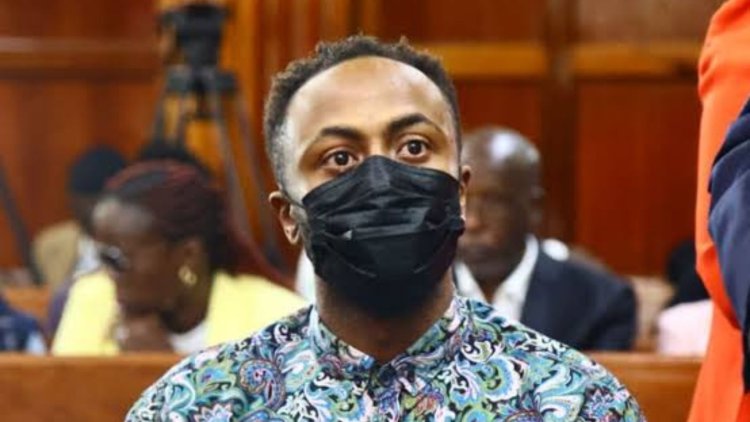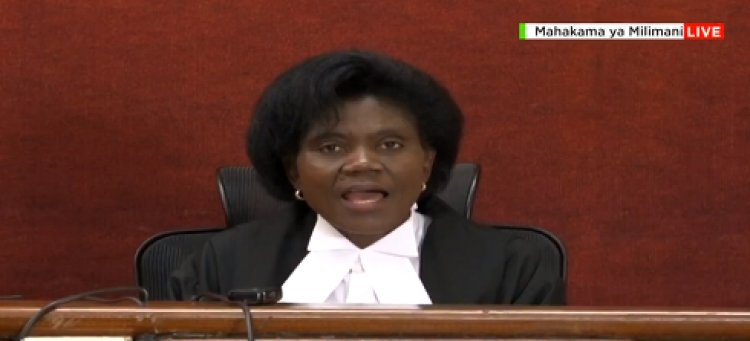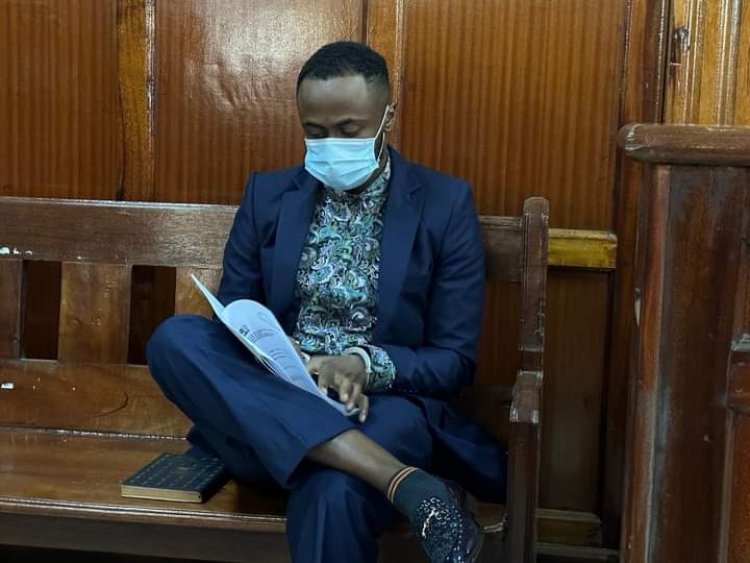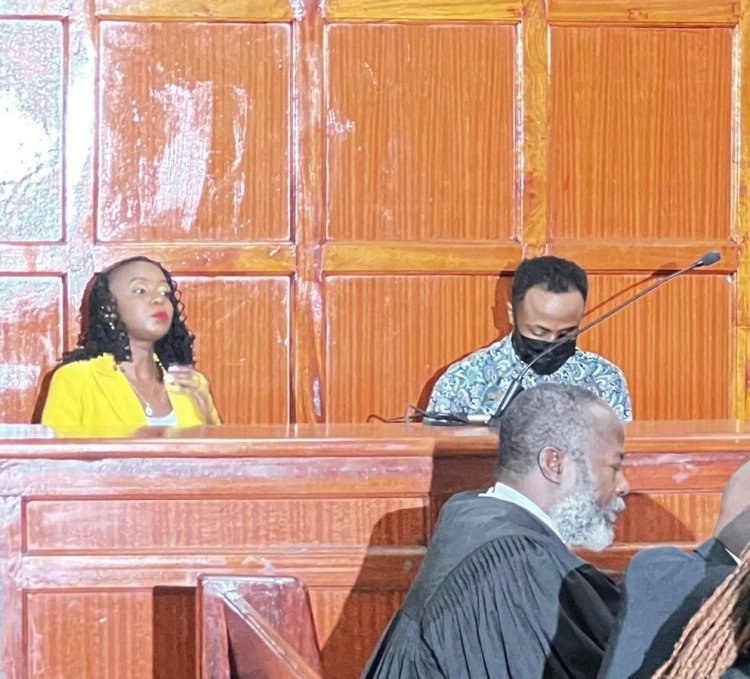4 Factors That Could Swing In Jowie Irungu's Favor Ahead Of Sentencing
The judge made the decision while criticising the Office of the Director of Public Prosecutions (ODPP), the victim's family and Jowie's lawyer for late filing of submissions.

Lady Justice Grace Nzioka on Friday, March 8 postponed the sentencing of Joseph Irungu alias Jowie who was found guilty for the murder of Nairobi businesswoman Monica Kimani, to Wednesday, March 13.
The judge made the decision while criticising the Office of the Director of Public Prosecutions (ODPP), the victim's family and Jowie's lawyer for late filing of submissions.
She indicated that the ODPP filed its submissions (pre-sentencing report) last evening while the victim's family filed its submissions on Friday morning. Therefore, owing to the delays, Jowie's legal team did not have time to respond to the submissions by the prosecution and Kimani's family.
Justice Nzioka also noted that the accused person, Jowie, had appointed another lawyer to represent him alongside his other counsel.

Lady Justice Grace Nzioka reads a judgment at Milimani Law Courts in Nairobi on February 9, 2024. /CITIZEN TV
In light of the new developments, Jowie's legal team requested more time to go through the two submissions and file their response. Justice Nzioka heeded to their request and directed that they file all the submissions by the end of Monday, March 11.
"As much as I started with a disclaimer on how I am not the one accused of adjourning this matter, I think at the end of the day I am the driver of this matter and the most decent thing to do is to apologise for any inconvenience caused.
"I hope we will not adjourn it again and that we will deal with this matter to its finality on the day that I have fixed for this judgement," she stated.
Justice Nzioka noted that Jowie's sentence will take into consideration all the documents filed, including the pre-sentence report.
A Pre-Sentence Report (PSR) is a report prepared by a probation officer to help the judge decide what sentence to give. It is used to find out about an offender’s background.
If a judge orders a PSR, a probation officer will do the following:
1. Assess of the Defendant
The PSR provides a detailed assessment of the defendant, including their background, character, mental and physical condition, and any other relevant factors that might influence the sentencing decision.
2. Risk Evaluation
The report evaluates the risk the defendant poses to the public and the likelihood of reoffending.
This risk assessment thus helps in determining the most appropriate sentence to reduce the chances of future offences.
3. Sentencing Recommendations
Based on the findings, the report may include recommendations for the type of sentence that could be most effective in rehabilitating the defendant or protecting the public.
These recommendations can include imprisonment, community service, probation, or participation in treatment programs.
4. Supporting Information
It provides the court with detailed information about the defendant’s personal circumstances, such as employment status, family ties, financial conditions, and any previous criminal history.
This information aids the judge in understanding the context of the defendant's actions and in making a more informed sentencing decision.
The judge is not bound to follow the recommendations of the pre-sentence report but usually gives them considerable weight.
The primary goal of the pre-sentence report is to enable a fair and individualised sentencing process that takes into account not only the severity of the offence but also the personal circumstances and rehabilitative needs of the defendant.
A case is usually adjourned to allow a probation officer time to prepare the PSR. It usually takes between two and six weeks to prepare.
The Case In a Nutshell
Lady Justice Grace Nzioka had indicated on Friday, February 9 that the prosecution had proved to the court that the security personnel committed the offence of murder.
Before the judgement, Justice Nzioka raised the following questions:
- Whether Jowie Irungu knew Monica before her death
- Whether he stole and used the stolen I.D to access where the deceased was staying
- Whether the clothes he was wearing implicate him in the commission of the offence
- Whether he was in the deceased house
- Whether he was the last person to be seen with the deceased
- Whether he had a gun and whether he was positively identified on the identification parade.

Jowie Irungu in court ahead of his sentencing on March 8, 2024. /PHOTO
Justice Nzioka found that Jowie deliberately misled the court by denying any prior acquaintance with the late Monica Kimani, as she found conclusive evidence contradicting his assertions, establishing his prior knowledge of Monica Kimani before her tragic demise.
In 2023 during the trial, Jowie told the court that he never knew Kimani and never visited her city residence in Kilimani the night she was killed.
“I never visited Monica at her residence and l never talked to her since l did not know her. I knew her brother George Kimani,” Jowie told the court.
"The 1st accused (Jowie Irungu) claimed he did not know the deceased at all. George Kimani, the deceased’s brother submitted that Jowie and Monica Kimani were in the same class in 2002 taking the same course in hotel and beverage management," the judge countered.
The court further agreed with the prosecution's evidence that the security personnel was the last person to be with the businesswoman before her death.
"When the Doctrine of Last Seen is applied, the law presumes that the person last seen with the deceased was responsible for their death, and the accused is supposed to present an explanation of what happened," she stated.
Furthermore, the court found that Jowie stole the identification card of Dominic Bisera Haron, a resident of the same Langata Road estate where Jowie and Jacque Maribe resided.
The ID presented to the guard by a person entering Monica's apartment complex on the fateful day had gone missing at the Royal Apartments, where Jowie and Jacque were residents, just two days before the tragic murder.
Aftermath Of Guilty Ruling
Following the conviction, Jowie was stripped of his bond terms as he was taken into custody pending his sentencing.
Ahead of Jowie's sentencing, the ODPP moved to file a notice of appeal against the High Court judgment that acquitted Maribe in the murder case.
Jowie's lawyer, Hassan Nandwa, also indicated that the murder convict would appeal the guilty verdict at the Court of Appeal after his sentencing.


 admin
admin 




